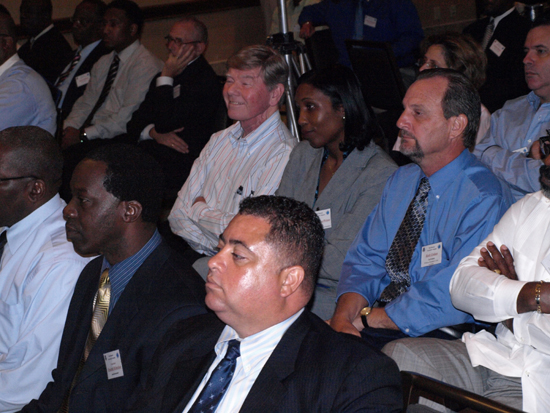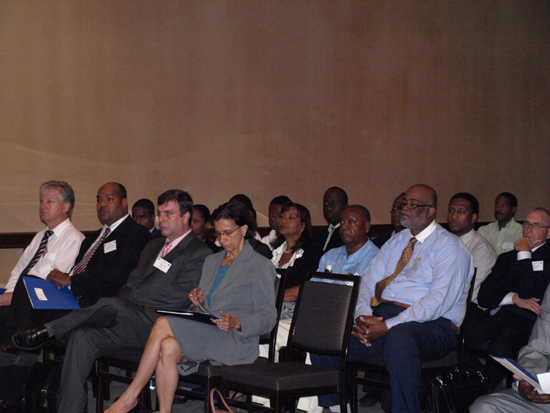 Dawn Beach:--- The first ever economic summit held yesterday to brain storm the effects of the global economic crisis and its effects on St. Maarten has been deemed successful so says President of the Chamber of Commerce Glen Carty who said that persons might be going into the summit with their own agendas.
Dawn Beach:--- The first ever economic summit held yesterday to brain storm the effects of the global economic crisis and its effects on St. Maarten has been deemed successful so says President of the Chamber of Commerce Glen Carty who said that persons might be going into the summit with their own agendas.
President of the Chamber of Commerce said it sometimes takes a crisis to get the best out of people. He said despite he is not able to say fully that the summit was a success he has seen team work and the several people giving their very best to come up with real solutions to tackle the problems. He said yesterday's event is just the beginning since the task force has to put that which was suggested on paper before execution takes place.
The tripartite summit was held between the unions, businesses and the island government. Several members of the media including two students of the St. Maarten Academy participated in the day long event.
At the close of the event a number of recommendations was suggested which would have to pass through the technical group (task force)who has to report back to those responsible in one month's time.
Moderator for the event Dennis Richardson described the event as unique since the three pillars of government worked effortlessly to safe the island from the economic storm ahead. Richardson said the recommendations were given to reduce the internal cost of doing business and living, by conducting price control on basic food items. Lower taxes on basic necessity, extend and offer favorable credit facilities, and tackle bureaucracy.  Another suggestion is to re-invest the revenues that are generated on St. Maarten, for the example the monies that is going to the central government should be re-invested locally for example the turn over tax.
Another suggestion is to re-invest the revenues that are generated on St. Maarten, for the example the monies that is going to the central government should be re-invested locally for example the turn over tax.
The incomes that are generated by the central bank should also be re-invested locally. Recommendations were given to strengthen the regional trade activities and diversification and transshipment and call centers. One way government can come up with the extra funds is to broaden its tax base as well as using strategic and more efficient measures to collects its revenues. More emphasis should also be placed on data collection that would created more update measures to boost the economy.
Commissioner of economic affairs Maria Buncamper Molanus clarified that these studies does not sit on shelves and take dust as was implied by Carty. She said the island government always uses these studies to make concise decisions. Buncamper Molanus said she believed that the summit gave everyone who participated to experience how difficult it is to come up with solutions in an environment and circumstances that are challenging particularly when there are some many factors that are beyond ones control.
The commissioner outlined some of the suggestions which were provided. She said that she does not expect the media to give up their role as the watch dog role but instead of focusing on the problems they should focus on solutions. She said while it was suggested that the premiums from the health care sector should remain locally, the national health plan would do just that when St. Maarten achieves it country status in January 2010.












